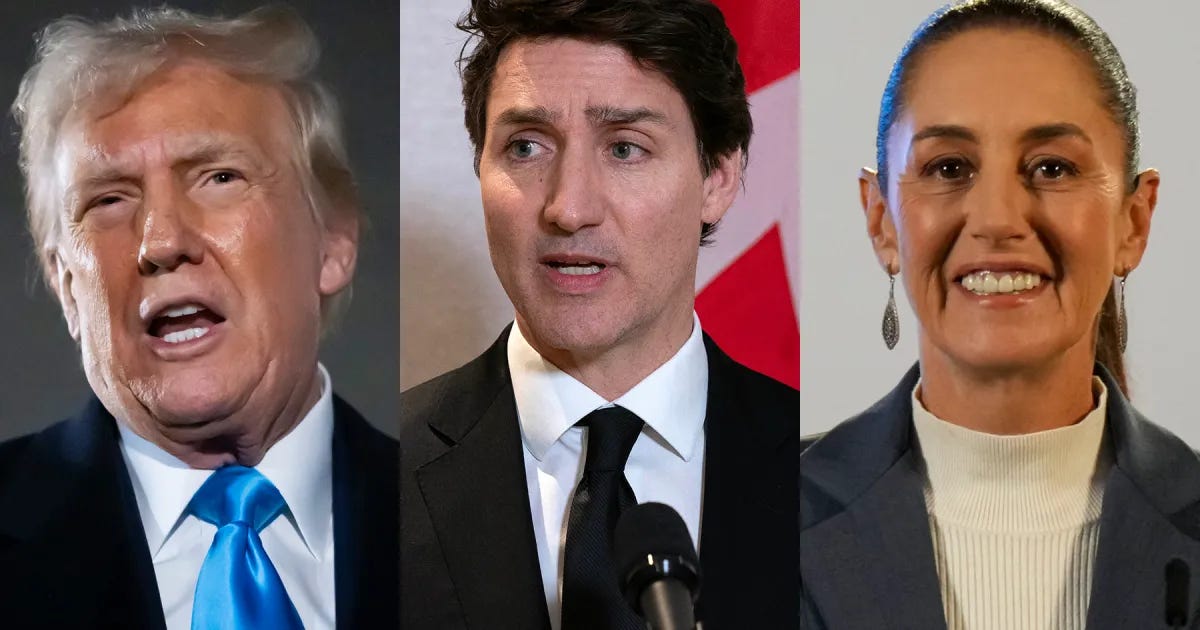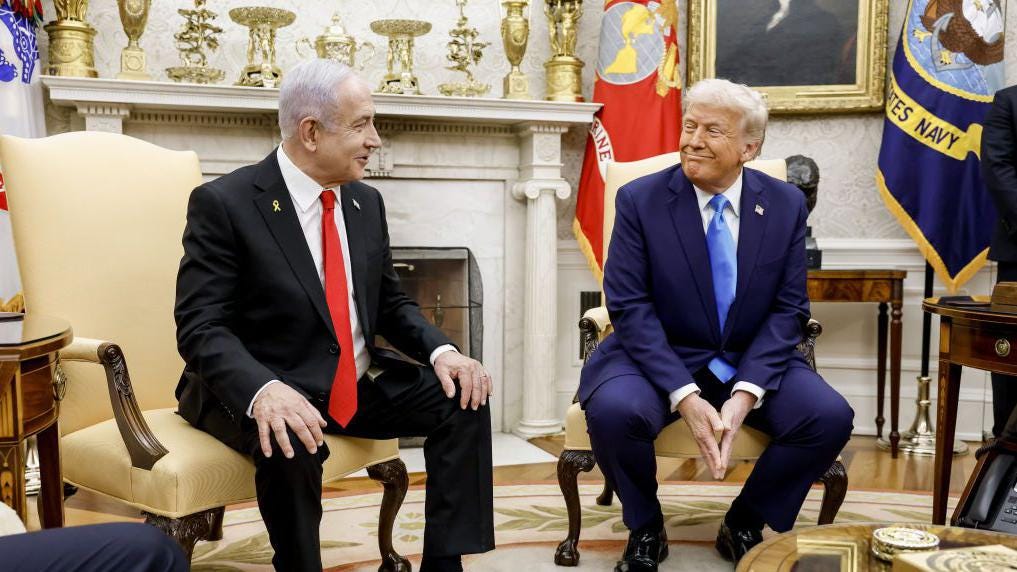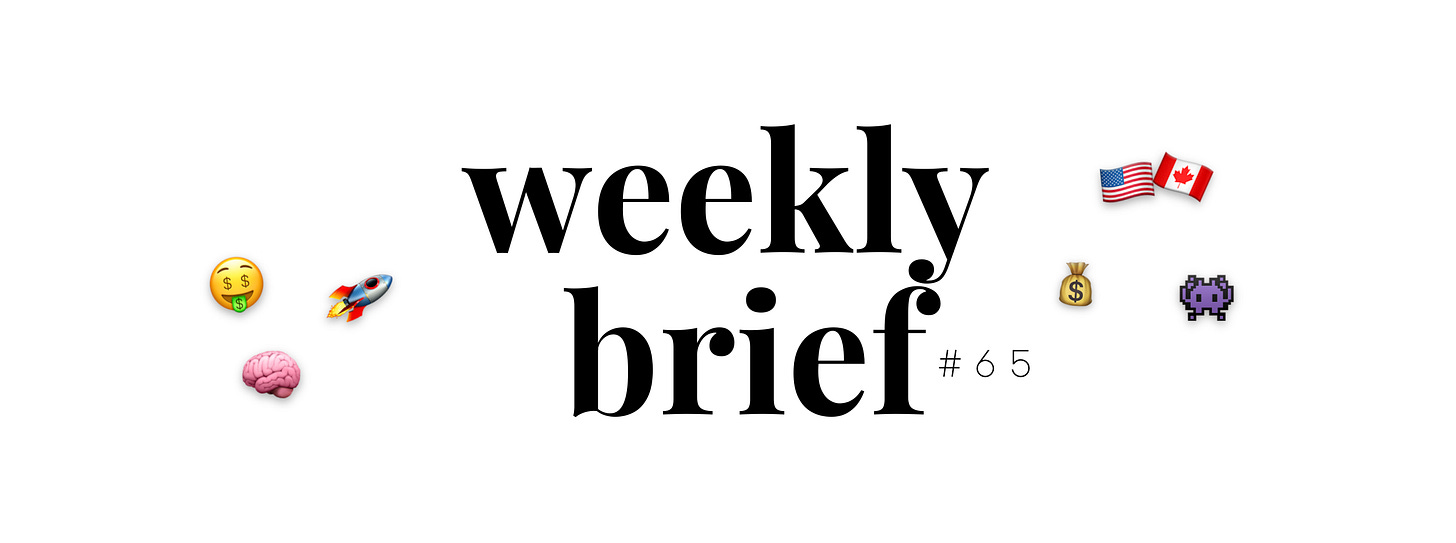Weekly Brief #65
The world’s shortest tariff war... SailPoint eyes $11.5 billion IPO, Amazon’s AI Alexa is on the way, Nissan-Honda merger has troubles, MicroStrategy rebrands to Strategy, and more.
A huge welcome to the 55 investors who joined The J. Nicholas since last Weekly Brief! Haven’t subscribed yet? Join 783 intelligent investors by subscribing here.
Good morning investor 👋,
Welcome back to the 65th Weekly Brief.
This week’s performance:
S&P 500: -0.22% | Nasdaq: -0.20% | Dow Jones: -0.68% | TSX: -1.12% | Gold: +1.67% | Bitcoin: -7.43% | The Quality Fund: +0.53%.
Phew, what a week. Like many, I was a recent survivor of the vicious, extraordinary trade war of 2025. It was tough… despite not actually happening, yet somehow happening nonetheless. I’d like to discuss this trade war we just experienced—why it started, why it’s still on the horizon, and the (assumed) reasoning behind it. Plus, its effects.
Let’s get into it. (11 min read)
In this issue:
💱 The world’s shortest tariff war
🚘 Nissan-Honda merger has troubles
🇺🇸 Proposed U.S. control over Gaza
FEATURED STORY

💱 The world’s shortest tariff war
This week, in what felt like a fast-forwarded movie clip—something out of a storybook—North America was pushed into a tariff war, only for it to be paused before it even began. This involved Canada, Mexico, and, of course, the United States—which, in the span of a few days, saw incredible political drama that led to a brief stock market dip of ±3% (it quickly recovered).
The story began last Saturday when Trump signed an executive order imposing 25% tariffs on Canada and Mexico (and 10% on China). Canada responded quickly, with Prime Minister Trudeau announcing $150 billion+ in retaliatory tariffs on American goods at the same 25% rate. These tariffs were expected to take effect on Tuesday, alongside an official response from Mexican President Claudia Pardo, who issued a video statement addressing Trump’s actions.
If you’re unfamiliar with Trump’s previous tariff threats, he stated in a November 2024 Truth Social post that if illegal immigration and fentanyl trafficking from Canada and Mexico were not stopped completely, he would impose 25% import tariffs on both countries’ on day one in office. (That date was later moved to February 1, 2025, with an exception for Canadian energy, which was hit with an only 10% tariff to help ease U.S. gasoline costs.) To justify these tariffs, Trump declared these issues national emergencies on inauguration day—a legal manoeuvre to bypass USMCA, the free trade agreement he himself signed.
Despite Canada’s very small contributions to both of these issues (less than 1%), Trump followed through with the tariffs on Feb 1. An exhausting day later—after phone calls with the leaders of Canada and Mexico—the tariffs were postponed for 30 days, with Canada and Mexico agreeing to deploy 10,000 personnel and 10,000 troops each on their sides of the border to address the concerns.
Trump seemed satisfied, and he granted leeway—just one day before Canada’s retaliatory tariffs were set to take effect.
The logic behind these tariffs—particularly against Canada, which is America’s closest ally and friend—I still don’t understand. The U.S. benefits immensely from trade with Canada, yet under this whole situation, Trump remained soft on China and hit Canada and Mexico hard (10% on China vs. 25% on Canada/Mexico). From a geopolitical perspective, targeting China would make far more sense than imposing much harsher tariffs on America’s two biggest trade partners. Again, not to mention, for the actual reasons why Trump says he’s placing the tariffs, Canada does not attribute to those problems meaningfully.
Here’s what I mean: In a recent year, 50 lbs of fentanyl was seized at the U.S.-Canada border, compared to 20,000+ lbs at the southern border. Similarly, about 198,000 undocumented migrants entered the U.S. from Canada, while nearly 3 million crossed from the south. (Source)
Another source:
My thoughts
I wrote a post on my Blossom account the day Trump signed the tariff order. Since I’ve noticed that many of you don’t follow me there (or can’t due to location—both reasons are totally fine by the way), I’ll respectfully copy and paste that post here to avoid repeating myself:
It’s official, President Trump has signed orders on behalf of the United States of America, placing 25% import tariffs on Canada and Mexico, 10% on China. A tariff for Canadian energy will not reach the same 25%; instead, on February 18, it will be placed at 10%.
What does this mean for Canada? Well, Americans have—just like that—begun paying 25% more on everyday products imported from Canada, and 10% more for our oil and energy:
Quick breakdown of a few crucial imports (approximately):
• Canadian oil: 60% of U.S. crude oil imports.
• Canadian vegetables: 17% of U.S. vegetable imports.
• Canadian lumber: 80% of U.S. lumber imports.
• Canadian cars and car parts: 15% of U.S. car and car parts imports.
I wrote about the effects in a newsletter issue a few months ago, but what I wrote about then covered the economic impacts on both sides of the Northern North American border. How does this move affect the stock market in the coming weeks, months, or longer if these tariffs last? First, the obvious impact would be disruption in the supply chain.
As Andrew Chang explained in an older video. North American trade is very intermingled:
“The auto industry is a really good example of how damaging tariffs can be for those who have to pay them, because cars aren’t just built in one country. The engine might be built in one place, the transmission in another, then they’re assembled in yet another place—and all of these components can cross national borders multiple times before they magically turn into a car. A tariff charges a tax every time.”
Just like that, Canadian car part imports, which make up 15% of U.S. imports of the same category—Canada’s second-largest export—has become potentially exponentially more expensive. That supply chain is now crippled. Businesses are now paying that much more in costs, meaning businesses listed on the stock market are now going to hurt from this with lower profits. This is very likely to hurt stocks on Monday.
There’s a high chance that these tariffs will cause a sharp increase in prices for the American consumer. We can only speculate that this causes inflation, which means uncertainty, and therefore investor sentiment and the U.S. stock market will become fearful. Any manufacturing company with cross-border operations in these countries will be affected. Which is many. With the exception of service businesses.
Many American businesses will be affected. Because a tariff, remember, isn’t paid by the country as Trump thinks. It’s paid by the importer, which in this case is an American importer/company.
Keep in mind, when the market is uncertain, the effects to stocks are likely to be even to those that aren’t affected by the tariffs. Uncertainty leads to irrationality. Meaning it won’t matter to investors whether or not a stock is affected by the tariffs or not. Software stocks, entertainment stocks, everything is likely to hurt.
Canada does expect to retaliate with specific state-targeting tariffs like those for orange juice or whiskey like they did with Trump’s last term responding to steel tariffs. These are products exported to Canada from predominantly Republican states, which Canada hopes to leverage. But we’ll see. I assume the same will be done by Mexico.
Nonetheless, this isn’t a good thing. Trades wars aren’t beneficial for anyone. It’s terrible for American consumers, and terrible for Canada’s economy. Including when we reach that oil tariff deadline. It will affect America harder short term, but the long-term affects for Canada are detrimental. Both will hurt regardless. Stay invested. Stay rational… but prepare for market turbulence.
Is this a negotiation tactic? Is it not a negotiation tactic? Time will tell. Stay tuned. And happy investing.
Past write-ups involving Canada’s economy:
FINANCE

a. 📈 SailPoint eyes $11.5 billion IPO
Cybersecurity company SailPoint is set to IPO at around $11.5 billion soon, marking the first major tech listing announcement of 2025 (so far). The company is offering 50 million shares at $19–$21 to raise up to $1.05 billion.
SailPoint operates in the fast-growing identity security market, with 94% of its revenue coming from subscriptions. Asset management firms AllianceBernstein and Dragoneer plan to buy up to 20% of shares. The company is currently operating at a net loss and remains unprofitable as of now. SailPoint was previously public from 2017 to 2022, until it was acquired by Thoma Bravo for ~$6 billion. Morgan Stanley and Goldman Sachs will lead the IPO.
b. 🤖 Amazon’s AI Alexa is on the way
This week, Amazon sent out five invitations for an event in New York City on February 26, 2025, hosted by Senior Vice President Panos Panay and the Amazon Devices & Services team. The invite featured a design that hinted at Alexa, and, funnily enough, the invitations together spell out “Alexa.”
Reports from Reuters say the event will unveil a new generative AI-powered Alexa (which we have been expecting for many months), although details remain a bit fuzzy. What we know so far is that the service could be offered free to a limited group, with a potential $5–$10 subscription for full access. Classic Alexa will remain free, but no new features are expected. The real challenge will be differentiating this new service from existing AI models.
BUSINESS

c. 🚘 Nissan-Honda merger has troubles
Nissan has reportedly rejected the proposed merger with Honda this week over “unfavourable terms” that would have made it a subsidiary. Cultural differences between the two companies and uncertainties over operational integration also played a role in the merger’s collapse.
In December 2024, both companies announced merger plans (which I wrote about (link below) to combine under a single holding company, which would have made them the third-largest automaker globally. The rejection increases pressure on Nissan, which has been losing ground in key markets, especially China. In fact, Nissan plans to cut 9,000 jobs and reduce factory capacity by 20%. An official decision is expected by mid-February.
Related articles:
d. ₿ MicroStrategy rebrands to Strategy
MicroStrategy officially unveiled a rebrand on Wednesday, now operating under the name “Strategy,” with a new logo featuring a Bitcoin symbol (see the heading of this section). The company claims to be “the world’s first and largest Bitcoin Treasury Company.”
Strategy holds over 470,000 bitcoins, worth an estimated $30 billion, and plans to raise $42 billion over three years to fund its crypto strategy. The company is essentially an unofficially leveraged Bitcoin holding company—a very volatile and frankly overvalued business because of that. It is now the world’s largest Bitcoin holder, and its stock has outperformed Bitcoin over the last five years (just to further solidify my point that this stock is purely hype).
POLITICS

e. 🇺🇸 Proposed U.S. control over Gaza
President Trump proposed the idea of seizing control of Gaza this week, telling the press that the U.S. should take responsibility for rebuilding the area into a “mecca for jobs and tourism.” The Palestinian population would be relocated to nearby countries like Egypt. The idea was introduced during a meeting with Israeli Prime Minister Benjamin Netanyahu, who supported the plan.
Trump’s proposal raises (1) legal and (2) geopolitical concerns, as forcibly removing populations violates international law. Trump mentioned that Palestinians would be "thrilled" with resettlement, and although no specific plans were offered, he repeatedly referred to the idea as “a great opportunity” for the region. Whether this would be an economic development opportunity or a further destabilization of the Middle East remains up for debate.
Related articles:
📚 Book of the Week
For every book purchased using the links below, 100% of affiliate commissions are donated to charity. (Amount donated so far: $34.32.)
My full bookshelf: Here.
The Mountain Is You - Brianna Wiest
Book Description:
Coexisting but conflicting needs create self-sabotaging behaviors. This is why we resist efforts to change, often until they feel completely futile. But by extracting crucial insight from our most damaging habits, building emotional intelligence by better understanding our brains and bodies, releasing past experiences at a cellular level, and learning to act as our highest potential future selves, we can step out of our own way and into our potential.
For centuries, the mountain has been used as a metaphor for the big challenges we face, especially ones that seem impossible to overcome. To scale our mountains, we actually have to do the deep internal work of excavating trauma, building resilience, and adjusting how we show up for the climb. In the end, it is not the mountain we master, but ourselves.
Thanks for reading. Feel free to reply to this email or comment on the web if you need anything—I always reply. If you enjoyed today’s issue, feel free to share it with friends and family.
All the best,
Jacob
All of my links here.
Serious about high-quality stock investing? My best work is members-only. Don’t miss out on exclusive insights and benefits—upgrade today.









Canada has a much bigger fentanyl problem than the proportions seized at the border might suggest. The Falkland “super lab” is capable of producing tremendous amounts that are ending up somewhere… and perhaps they are not being seized because so much of the Canada/US border is undefended and porous. Trump’s threats need to be taken seriously. This isn’t over yet!
I don't think Canada commited any military or troops to the border. That's just Mexico.